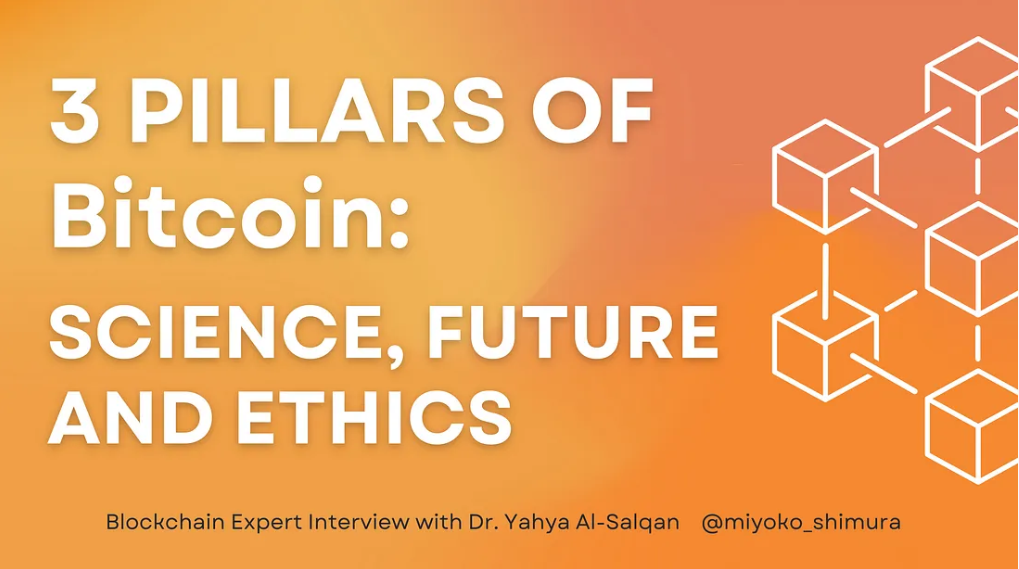Interview 3 Pillars of Bitcoin: Science, Future, and Ethics
-
 Miyoko Shimura
Miyoko Shimura - 07 Aug, 2023

Interview with Dr. Yahya Al-Salqan, the CEO of Jaffa.Net Software, with over 25 years of business experience in software solutions. He taught Computer Science at West Virginia University.
Prior to his role at Jaffa.Net, Dr. Al-Salqan served as a Cryptography engineer at Sun Microsystems in Silicon Valley, California. His academic background includes a PhD in Electrical Engineering and Computer Science from the University of Illinois. In the Information and Internet security domain, he published about fifty articles and registered nine patents.
Interviewer: From your perspective as an entrepreneur, how do you think blockchain can help with the needs of the world?
Dr. Al-Salqan: This is a very good starting question to provide a brief history of blockchain. It all began when Satoshi Nakamoto published the white paper in 2008, showing a proposed solution for the global financial crisis.
Blockchain has emerged as a potential solution to the intrinsic loopholes in the current financial and monetary system, particularly evident during periods of continuous financial crises. By revolutionizing the internet and empowering individuals with science and technology, blockchain offers not just a means of financial transactions but also a pathway to financial liberation.
I think Bitcoin comes as the leader of cryptography and serves as the foundational technology for blockchain. It was easy for me to see the vision and to understand it quickly because of the fact that I’ve been in the cryptography business and information security for quite some time.

Photo by Werner Du plessis on Unsplash
Interviewer: What are the top three keywords that currently fascinate you in the Bitcoin field?
Dr. Yahya Al-Salqan: The first keyword is “science.” In the world of cryptocurrencies and blockchain, science and mathematics play a fundamental role. I trust the principles of science and cryptography more than relying on third parties or governments. The strength of Bitcoin lies in its scientific foundation, making it a secure and trustworthy medium of exchange of value.
The God created the whole physical universe in the first several days. Then, spend rest of different days afterwards to put the principles of Science in the materials after it has been created — that tells us how much important science is for the evolution of humanity.
Interviewer: I am a big fan of the paper, “The God’s Protocol” published by computer scientist Nick Szabo in 1997, because of its theoretical beauty.
- In the God Protocols, Szabo describes a theoretical framework for secure multiparty computation. The concept proposes a hypothetical protocol that would allow two or more parties to share a computation while keeping their inputs confidential from each other.
- Interestingly, the God Protocols was published in 1997, which is 12 years before Bitcoin was created in 2009. The protocol is similar to the way that Bitcoin works, as it allows users to send and receive payments without revealing their financial information to each other.

Photo by NASA on Unsplash
Dr. Yahya Al-Salqan: The second keyword is “the future.” Despite the uncertainty surrounding Bitcoin’s success, having faith in its fundamental principles allows us to envision a brighter future. Embracing change and actively contributing to the Bitcoin ecosystem can lead to significant advancements and benefits for entrepreneurs and individuals.
The third keyword is “ethical change.” Bitcoin also represents an ethical change towards more democratizing economies.
In the current system, artists often receive a quite small percentage of the revenue generated from their work, while the companies retain a significant portion. In contrast, an artist who applies an NFT to their art or music can preserve their intellectual property.
Embracing blockchain technology allows for a more ethical and fair approach where individuals can truly own and benefit from their creations. In a nutshell, three fundamental principles of Bitcoin are science, the future, and ethical change.
Interviewer: In your blockchain journey, is there any failure or challenge that you would like to share with us?
Dr. Yahya Al-Salqan: I start with the failures because we always learn from failures. I currently live in a country where crypto is forbidden, and around four years ago, I developed a program called “VeriCert.”
“VeriCert” is actually for verification of certificates, especially for higher education. When an individual graduates from a university, that university will publish that certificate on the blockchain so that individuals cannot tamper or forge that certificate.
When we began attempting to introduce this solution to the local universities here, we faced the challenge of regulations. But that did not deter us from persistently pursuing our cryptocurrency business. At present, we are exploring the possibility of establishing a startup, either exclusively in Europe or within the United States, with the aim of effectively navigating and overcoming the regulatory landscape.
This is one of the lessons I learned — the importance of regulations which actually affected us in terms of the fast changes in the crypto, especially in Ethereum, which we used to develop our own solution for dynamic NFTs.
Interviewer: Could you share with us any thoughts on the current state of the cryptocurrency market and its trends?
Dr. Yahya Al-Salqan: Concerning insights of the current market and technology situation, I believe that the overall adoption of blockchain, particularly cryptocurrency like Bitcoin, is progressing significantly.
After the creation of the Lightning Network built on top of the Bitcoin platform, the process of transmitting and receiving money has been significantly streamlined. This can be done by using the Lightning Network as a second layer, resulting in faster, more cost-effective, and more secure transactions compared to its original inventions.
The integration of dynamic NFTs (dNFTs) has simplified solutions for both individuals and businesses. As an example, I’m currently developing an application called “iLoya” aimed at democratizing reward systems and loyalty solutions using dynamic NFTs.
Within “iLoya” program, the rewards system goes beyond just fostering loyalty between businesses and customers; it reaches into the domain of social media. With the maturation of these technologies, there’s a growing potential to create more applications within this utility.

Photo by Zyro on Unsplash
Dr. Yahya Al-Salqan: Imagine a scenario where you purchase a book from Amazon and write a review. If I appreciate your review and like it, I could receive rewards in terms of Satoshi, for instance. This concept aligns with what “iLoya” aims to achieve. If I read your review and decide to buy the book, I could also receive rewards from Amazon, such as rewards points or incentives.
Ethereum’s utility expansion, particularly in NFT business cases and DeFi protocols, is making strides towards mainstream adoption. However, despite these advancements, there’s still much work to be done in terms of developing use cases and applications. Ensuring the usability for the general public remains a crucial priority.
Interviewer: What is your long-term vision in terms of Web3, and how long do you think it will go?
Dr. Yahya Al-Salqan: I don’t possess a crystal ball — but I’m confident that as we progress into the future — perhaps not in 10 or 20 years, but even sooner — Bitcoin will establish itself as a significant technological presence. It will function as a key digital asset, much like digital gold, a store of value, and a means of digitizing money. Furthermore, I envision the Lightning Network, built on top of Bitcoin, becoming a tangible method of payment.
For instance, the company Strike in the US, alongside several others with the same concept. Picture this scenario: I’m in the US, you are in India, and I want to pay you for a service. Through the Lightning Network, I pay you in dollars, and you receive the equivalent amount, be it in Bitcoin or Rupees, instantly and seamlessly. You won’t need to understand the technical intricacies; the transaction happens in a matter of seconds.
On the other hand, if I were to use PayPal or a credit card, you will wait around a month for the funds to be paid. Bitcoin and Lightning can offer an immediate solution, at a fraction of the cost. I firmly believe in the power of science and mathematics.

Photo by Bastian Riccardi on Unsplash
Besides, consider another scenario: Platforms like Netflix. They typically offer a fixed monthly subscription, but with Lightning and Bitcoin, it doesn’t have to be a one-size-fits-all approach. By implementing Lightning on their service, Netflix could enable users to pay based on their actual usage.
It’s akin to monetizing the service per second, per byte, or however you consume content. This way, you don’t need to adhere to a fixed monthly fee. Bitcoin’s flexibility allows for fairer payment based on actual usage — I firmly believe in the power of science and mathematics.
Interviewer: Thank you for sharing thoughtful consideration of future opportunities. We see numerous opportunities in leveraging blockchain technology for worldwide transactions and micropayments!
Final Thoughts
The main motivation behind my interview with Dr. Yahya Al-Salqan stems from his notable proficiency as a technologist and entrepreneur in Computer Science domain. Particularly, he possesses a comprehensive understanding of the intricate landscape of blockchain and cryptocurrencies.
What most impressed me was how he emphasized the role of science, the future, and ethical change in blockchain technology, despite the fleeting nature of fads in the ever-changing market. As a computer scientist, he certainly envisions a world where Bitcoin becomes a major digital asset and store of value, empowering individuals on a global scale.


